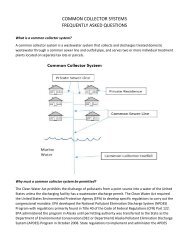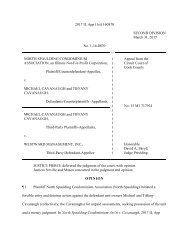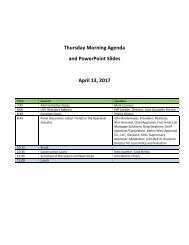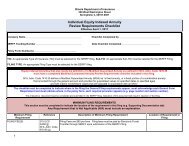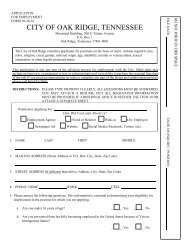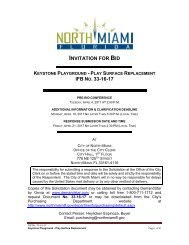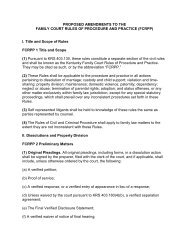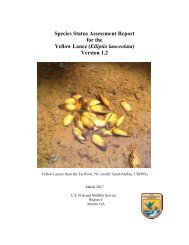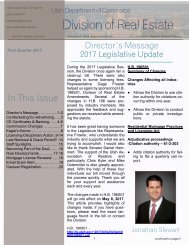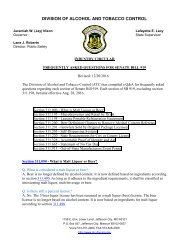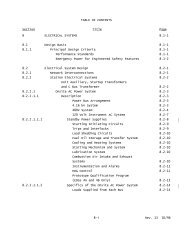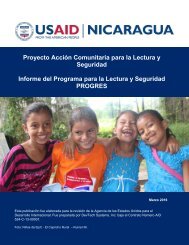Gender Integration
pbaae696
pbaae696
You also want an ePaper? Increase the reach of your titles
YUMPU automatically turns print PDFs into web optimized ePapers that Google loves.
Support civil society to conduct media monitoring for<br />
gender differences in treatment of candidates.<br />
• Affirmative Measures. Provide technical assistance to<br />
political parties, legislators, staff, and government representatives<br />
on the creation and/or implementation of quotas<br />
or other affirmative measures that help remedy historic<br />
marginalization and facilitate greater representation of<br />
women in parliament.<br />
• Internships and mentoring. Support legislative<br />
internship, mentoring, and exchange programs to provide<br />
staff for youth and women members. Internships for<br />
university students to staff women legislators can help fill<br />
vital staffing gaps and expose young people to positive<br />
women role models.<br />
• Networking. Provide support for efforts to increase<br />
networking and professional development opportunities for<br />
women and others who may lack access and connections to<br />
existing networks.<br />
• Political Violence. Study and combat politically motivated<br />
violence perpetrated against female candidates.<br />
Challenge: Enhance the skills and influence of women<br />
in the legislature.<br />
Opportunities:<br />
• Orientation. Include training on gender (in)equality and<br />
gender analysis as a regular component of orientation and<br />
training sessions for all newly elected legislators and newly<br />
hired staff. Include a breakout or additional session(s) for<br />
newly elected women, who often have different or additional<br />
needs than their male counterparts.<br />
• Training and professional development. Provide ongoing<br />
training and professional development opportunities for<br />
women and minority group members of parliament.<br />
Developing expertise in areas that may be viewed as<br />
“non-traditional” for women, such as defense and finance,<br />
is often a path to powerful committee assignments.<br />
Experience has also shown that women in particular<br />
appreciate ongoing capacity building opportunities in skills<br />
such as public speaking, leadership, political management<br />
and communication, networking, and fundraising.<br />
• Women’s caucuses. Support efforts to create or<br />
strengthen women’s caucuses, particularly multi-party<br />
caucuses. Such caucuses provide important networking and<br />
mentoring opportunities, help consolidate and leverage the<br />
power of women in parliament, and often provide a venue<br />
for skills development and advancing legislation on issues<br />
of particular concern to women. Provide capacity building<br />
support for women’s caucuses or other identity-based<br />
groups to draft and advocate for legislation on a range<br />
of issues.<br />
• Coalition-building. Support the development of coalitions<br />
that support gender equality, including both male and female<br />
legislators. Engaging and supporting male allies can help<br />
garner broader support for issues related to gender equality<br />
and female empowerment, and may also contribute to<br />
shifting institutional culture.<br />
• Public outreach. To mobilize support for women’s<br />
caucuses and gender equality issues, develop the capacity<br />
of women’s caucuses to engage in public outreach including,<br />
but not limited to: participating in radio and TV programs;<br />
hosting events; engaging in charitable activities; and creating<br />
PROGRAM SNAPSHOT<br />
The Inter-Parliamentary Union (IPU),<br />
with support from USAID, is implementing<br />
the <strong>Gender</strong> Equality in Politics<br />
Program. In 2012, the IPU began a<br />
global research project on women’s parliamentary<br />
caucuses. It mapped existing<br />
structures, identified good practices,<br />
and produced a set of guidelines for<br />
women members of parliament (MPs)<br />
who wish to set up a caucus or improve<br />
an already existing one. Based on the<br />
research carried out, the IPU Handbook<br />
on Women’s Caucuses was produced<br />
with information from more than 72<br />
parliaments and 60 women’s caucuses<br />
collected. Additionally, they conducted a<br />
regional seminar that brought together<br />
40 men and women MPs from eight<br />
countries in East and Southern Africa.<br />
The meeting endorsed a set of priority<br />
steps for parliaments to take in order<br />
to secure a robust response to violence<br />
against women (VAW), including:<br />
adopting comprehensive legislation;<br />
allocating budgetary resources to ensure<br />
adequate funding and long-term sustainability<br />
of programs; and establishing a<br />
monitoring system to periodically assess<br />
the implementation and effectiveness of<br />
legislation on VAW. Most recently, the<br />
IPU conducted workshops and seminars<br />
in several countries, including Cote<br />
d’Ivoire and Burundi, bringing together<br />
MPs, government officials, and civil<br />
society activists to discuss issues such as<br />
gender based violence, gender and land<br />
reform, and women’s caucuses.<br />
Source: “Guidelines for Women’s<br />
Caucuses,” Inter-Parliamentary<br />
Union, 2013.<br />
40<br />
USAID | <strong>Gender</strong> <strong>Integration</strong> in Democracy, Human Rights, and Governance (DRG) Programming Toolkit



